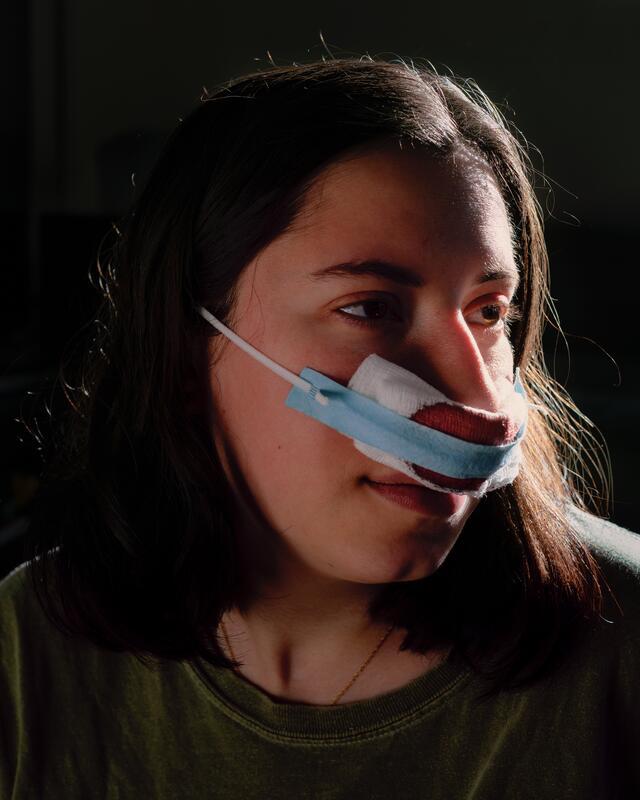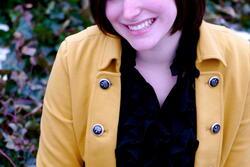My Nose Job Helped Me Embrace the “Too-Muchness” of Being a Jewish Woman
As a Jew with anxiety (perhaps this is redundant), having a nose that doesn’t smell so well during a pandemic for which the most notable symptom is loss of smell is…well…anxiety- inducing. Luckily—or maybe not so luckily— my poor sense of smell is not due to COVID, but because my “Ashki nose” is significantly taller than it is wide, restricting my airways and making it difficult for me to breathe.
Throughout the 23 years my nose and I have spent together, our relationship has been fraught. From being likened to a parrot by pre-pubescent boys to being told by my middle school theater teacher that my voice was “too loud and nasal,” I quickly learned that my nose was “too much”—and so was I.
Although in retrospect, the hump protruding from the top of my nose was an indicator of my Ashkenazi heritage—or at least a common stereotype of Ashkenazim—I’d never associated my nose with my Jewish identity. I grew up in a secular household with next to no knowledge of Jewish life, aside from an annual family Hanukkah gathering or a Passover seder. The Shuman sisters, on my mom’s side, had a different type of “Jewish nose” entirely—what my mom always referred to as “bulbous.” Rather than the tall, humped nose I inherited from my dad’s side, they had short, plump noses similar to Dr. Ruth’s. Without much else to connect me to Judaism, the Shuman noses became synonymous with being Jewish in my mind, and my lack thereof made me feel like I wasn’t “Jewish enough.” (Imposter syndrome is real…but that's a conversation I'll save for my therapist, or perhaps another blog post.)
My relationship with my nose began to shift when I started college as an acting major. Despite stereotypes about Jews and acting, I was one of the few Jews in the program, so my nose quickly became something I and others used to distinguish me from my peers— sometimes in ways I didn’t love (even more to unpack in a therapy session).
A semester later, when I realized theater wasn’t for me, I transferred schools and became a Women and Gender Studies major, eager to replace the strong sense of community I’d had in theater with a new one. Cue the Hillel discovery story and my entry into the collegiate Jewish community.
At first, my secular upbringing and lack of ritual knowledge made me feel disconnected from my “more Jewish” peers. But eventually, my nose became something that helped me feel Jewish. I joined a Jewish sorority, began attending Shabbat dinners, and started learning more about Judaism from my peers and campus resources.
At the same time, I was reading the canonical texts of Adrienne Rich, Gayle Rubin, and Simone de Beauvoir, unpacking ideas about femininity and its role in our heteropatriarchal, white supremacist society, and realizing that the “too-muchness” of my personality and of my nose were deeply connected. As I grew into my feminist consciousness, I came to love the humped nose that so courageously held up my glasses.
So, on November 4, 2019, when I went to see the Ear, Nose, and Throat doctor for what I thought were just some incredibly inflamed tonsils (the size of golf balls, to be exact), only to hear him utter the word “rhinoplasty,” I was stunned. As he used a tent metaphor to explain that the height of my nose pulled on the sides and restricted my airways, I felt myself dissociating. My nose would need to be widened and the hump shaved down, he explained. My anxious brain immediately kicked into full gear as the history of Jewish women and their noses—everything from women electing to shave the glorious bumps off their noses to the legendary Babs refusing to alter her nose (a nose that looks like mine, I might add)—began racing through my mind.
I had learned to take pride in my nose, had formed a subversive identity around its not-so-cutesy shape, and had held it as a symbol of my rebellion against WASP beauty standards. If I changed my nose, wouldn’t I betray my wild, Jewish, feminist self?
I felt conflicted. On the one hand, like so many Jewish women before me, I had for so long wanted nothing more than to assimilate and have a small button nose, to evade the Happy Merchant stereotype that my side profile showcased. On the other hand, how could I, a radical Jewish feminist, cave to hegemonic beauty standards and change the part of myself that tethered me to my Jewish identity? I felt that by altering my body, I was accepting sexist beauty standards. Also, I had only just regained a sense of agency over this part of my body and felt like now it was being taken away from me. On top of all this, I felt guilty for linking my nose to my Jewish identity, when the very concept of a “Jewish nose” is deeply rooted in eugenics—there is no such thing as a universal Jewish nose!
Fast forward to over two years later (after a global pandemic and a cross-country move canceled my surgery the first time). I entered the hospital to meet with my new surgeon, who, to my delight, informed me that no aesthetic changes would be needed to make my nose function properly. My hump would remain intact, and my nose would be noticeably wider only to me… and maybe my mother.
So here I am, post-“septorhinoplasty with bilateral nasal valve repair,” realizing that, ironically, widening my nose might have made it more “bulbous” and Shuman-like than before. And although the shape of my nose has altered ever so slightly, what remains is the weight of antisemitism, patriarchy, and white supremacy when I tell someone I got a nose job. I’ve heard countless objectionable gut reactions—that any aesthetic changes women make are for the male gaze, for example, or that my nose job is cause for celebration because now I will look more conventionally attractive.
With each interaction, I am reminded that there is a lot of work left to be done within our society to deconstruct the systems of oppression behind these comments. And I have work to do, too—to accept that I, Emma Breitman, got a nose job, that this doesn’t undermine my feminist values, and that even if my surgery had drastically altered my nose shape, it wouldn’t make me any less Jewish.








You are a brave and courageous woman.
Very meaningful journey -- yourself is not your nose. You may want to read how the science of genetics has announced that the stereotype of the Jewish nose isn't Jewish at all -- it is Roman. European Jews are 25-75+% Roman & misc European. In the 1st century, numerous Judean men were killed & the women & children hauled back to Rome as slaves. The only 100% Hebrew people on Earth are Palestinians, who, it turns out, are the Levites/Cohens who never left.
What a great story and exploration of Jewishness and beauty. Loved it !